Report on Effective People Management Strategies in the NHS
VerifiedAdded on 2020/10/23
|10
|2851
|134
Report
AI Summary
This report provides an in-depth analysis of people management within the National Health Service (NHS). It explores the implementation of leadership models, training and development programs, and talent management strategies. The report evaluates key HR processes that underpin performance management, including the roles of NHS Sustainability and Transformation Partnerships (STPs), productivity improvements, and leadership development. It also addresses contemporary issues faced by line managers, such as staff management and engagement, patient dissatisfaction, patient discrimination, and employee turnover. The report highlights the importance of finance, better health, and better care within the NHS. It also emphasizes the role of HR in recruitment and record-keeping. The report concludes with a comprehensive overview of the challenges and opportunities in managing people within the complex healthcare environment of the NHS.
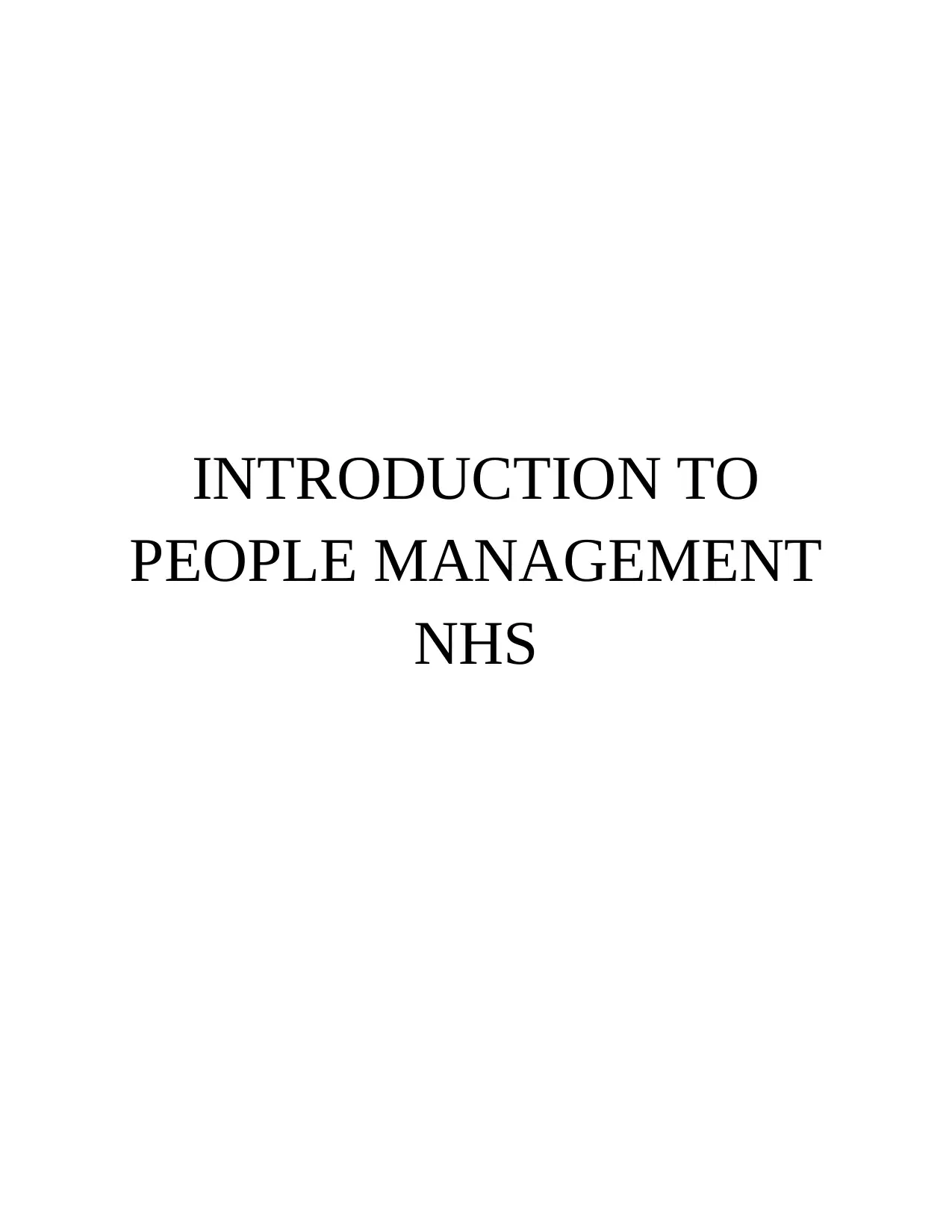
INTRODUCTION TO
PEOPLE MANAGEMENT
NHS
PEOPLE MANAGEMENT
NHS
Paraphrase This Document
Need a fresh take? Get an instant paraphrase of this document with our AI Paraphraser
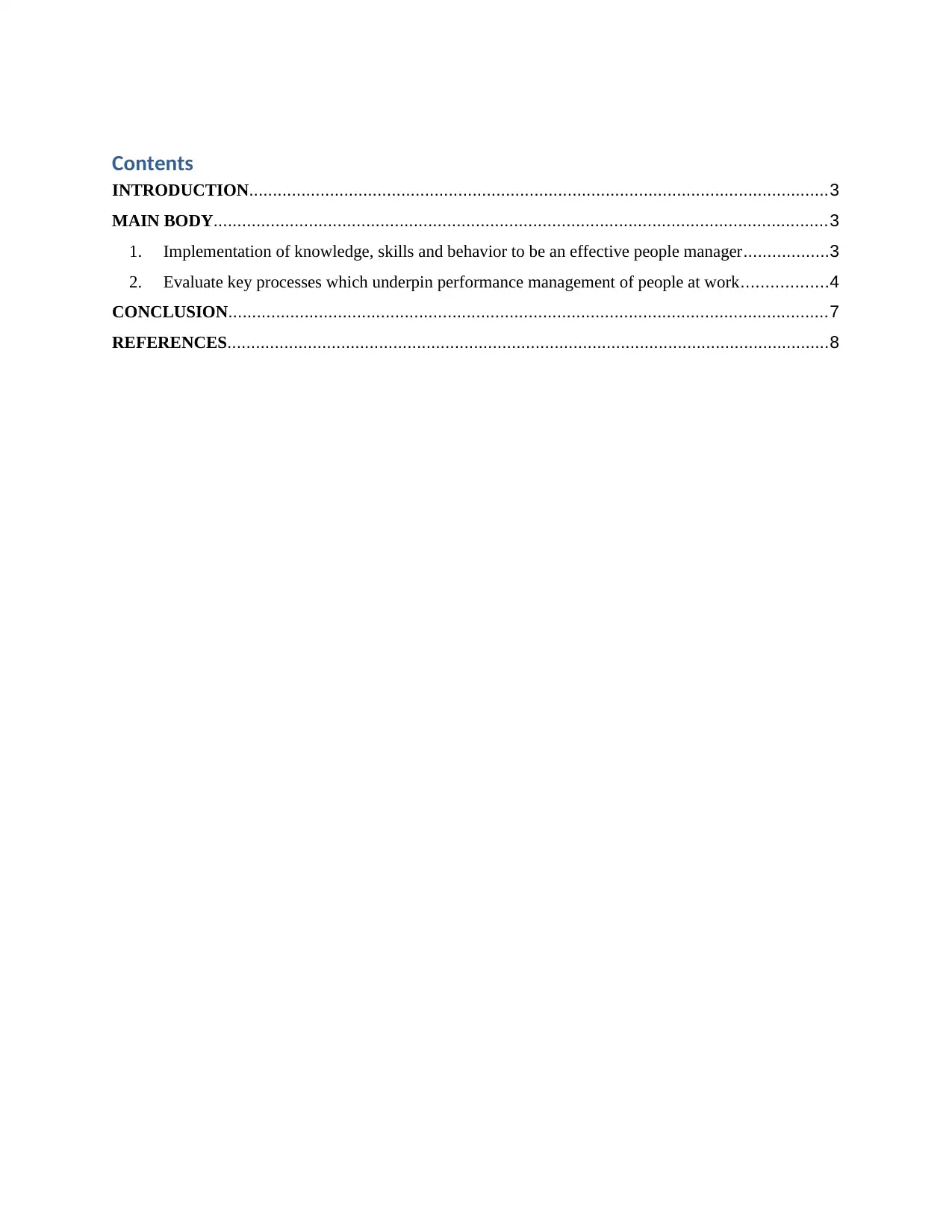
Contents
INTRODUCTION..........................................................................................................................3
MAIN BODY.................................................................................................................................3
1. Implementation of knowledge, skills and behavior to be an effective people manager..................3
2. Evaluate key processes which underpin performance management of people at work..................4
CONCLUSION..............................................................................................................................7
REFERENCES...............................................................................................................................8
INTRODUCTION..........................................................................................................................3
MAIN BODY.................................................................................................................................3
1. Implementation of knowledge, skills and behavior to be an effective people manager..................3
2. Evaluate key processes which underpin performance management of people at work..................4
CONCLUSION..............................................................................................................................7
REFERENCES...............................................................................................................................8
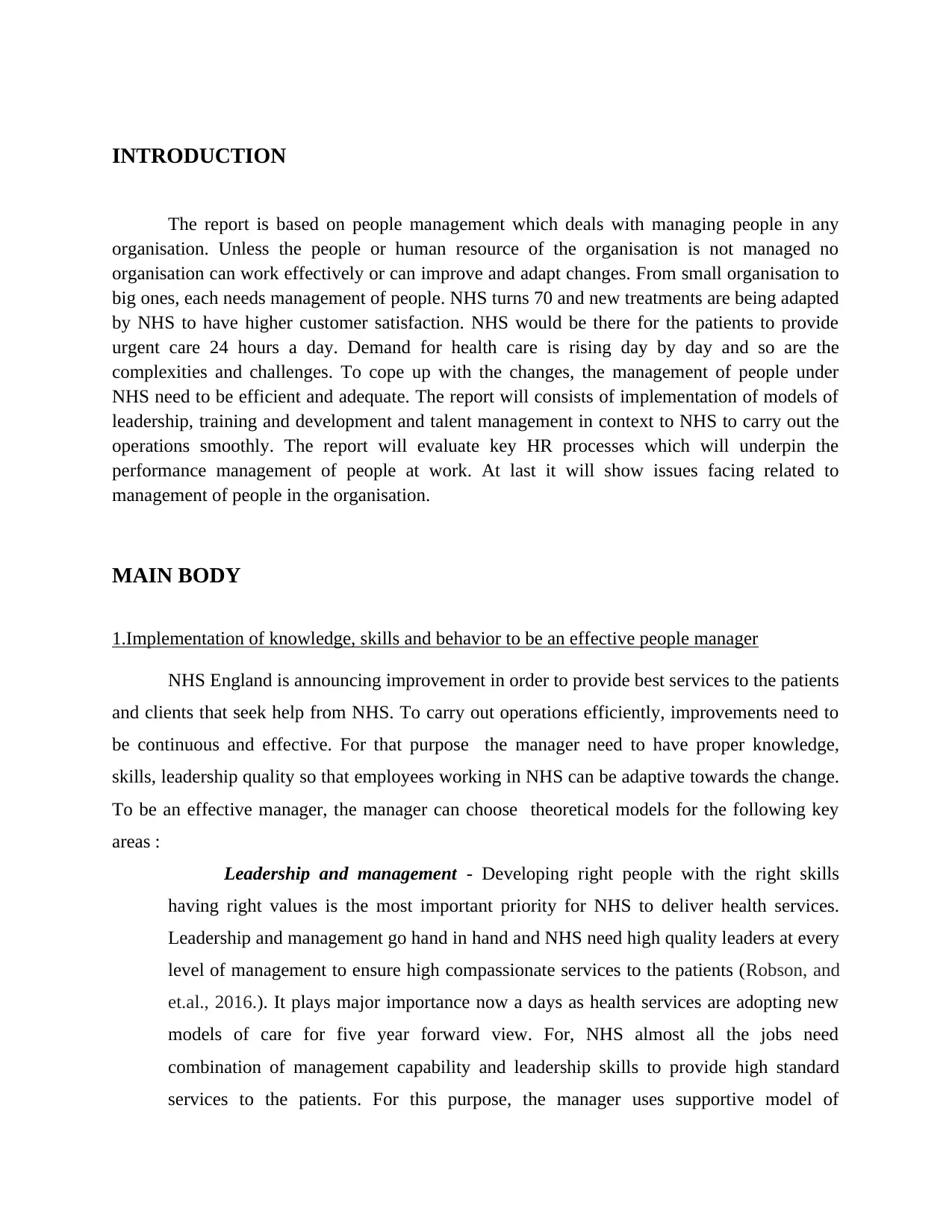
INTRODUCTION
The report is based on people management which deals with managing people in any
organisation. Unless the people or human resource of the organisation is not managed no
organisation can work effectively or can improve and adapt changes. From small organisation to
big ones, each needs management of people. NHS turns 70 and new treatments are being adapted
by NHS to have higher customer satisfaction. NHS would be there for the patients to provide
urgent care 24 hours a day. Demand for health care is rising day by day and so are the
complexities and challenges. To cope up with the changes, the management of people under
NHS need to be efficient and adequate. The report will consists of implementation of models of
leadership, training and development and talent management in context to NHS to carry out the
operations smoothly. The report will evaluate key HR processes which will underpin the
performance management of people at work. At last it will show issues facing related to
management of people in the organisation.
MAIN BODY
1.Implementation of knowledge, skills and behavior to be an effective people manager
NHS England is announcing improvement in order to provide best services to the patients
and clients that seek help from NHS. To carry out operations efficiently, improvements need to
be continuous and effective. For that purpose the manager need to have proper knowledge,
skills, leadership quality so that employees working in NHS can be adaptive towards the change.
To be an effective manager, the manager can choose theoretical models for the following key
areas :
Leadership and management - Developing right people with the right skills
having right values is the most important priority for NHS to deliver health services.
Leadership and management go hand in hand and NHS need high quality leaders at every
level of management to ensure high compassionate services to the patients (Robson, and
et.al., 2016.). It plays major importance now a days as health services are adopting new
models of care for five year forward view. For, NHS almost all the jobs need
combination of management capability and leadership skills to provide high standard
services to the patients. For this purpose, the manager uses supportive model of
The report is based on people management which deals with managing people in any
organisation. Unless the people or human resource of the organisation is not managed no
organisation can work effectively or can improve and adapt changes. From small organisation to
big ones, each needs management of people. NHS turns 70 and new treatments are being adapted
by NHS to have higher customer satisfaction. NHS would be there for the patients to provide
urgent care 24 hours a day. Demand for health care is rising day by day and so are the
complexities and challenges. To cope up with the changes, the management of people under
NHS need to be efficient and adequate. The report will consists of implementation of models of
leadership, training and development and talent management in context to NHS to carry out the
operations smoothly. The report will evaluate key HR processes which will underpin the
performance management of people at work. At last it will show issues facing related to
management of people in the organisation.
MAIN BODY
1.Implementation of knowledge, skills and behavior to be an effective people manager
NHS England is announcing improvement in order to provide best services to the patients
and clients that seek help from NHS. To carry out operations efficiently, improvements need to
be continuous and effective. For that purpose the manager need to have proper knowledge,
skills, leadership quality so that employees working in NHS can be adaptive towards the change.
To be an effective manager, the manager can choose theoretical models for the following key
areas :
Leadership and management - Developing right people with the right skills
having right values is the most important priority for NHS to deliver health services.
Leadership and management go hand in hand and NHS need high quality leaders at every
level of management to ensure high compassionate services to the patients (Robson, and
et.al., 2016.). It plays major importance now a days as health services are adopting new
models of care for five year forward view. For, NHS almost all the jobs need
combination of management capability and leadership skills to provide high standard
services to the patients. For this purpose, the manager uses supportive model of
⊘ This is a preview!⊘
Do you want full access?
Subscribe today to unlock all pages.

Trusted by 1+ million students worldwide
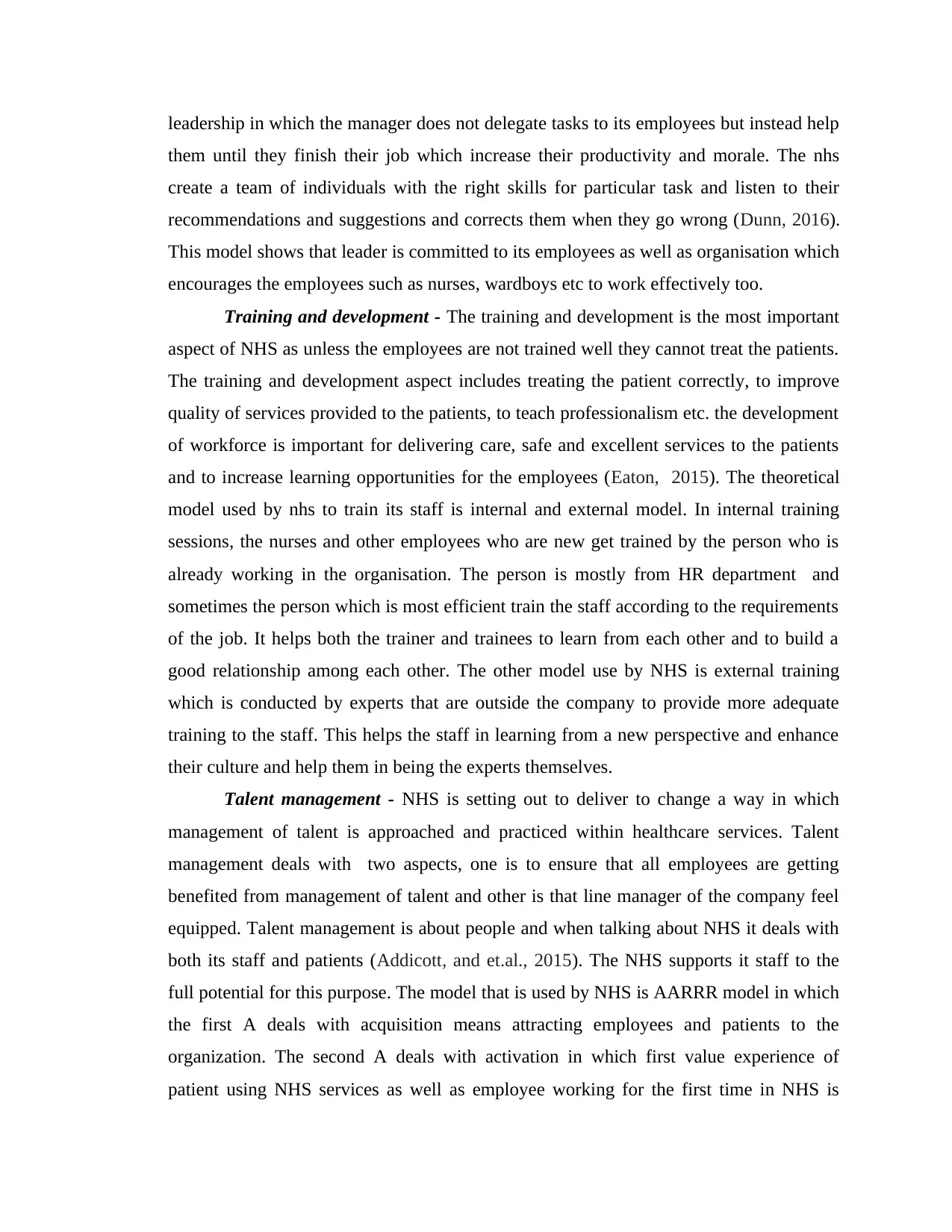
leadership in which the manager does not delegate tasks to its employees but instead help
them until they finish their job which increase their productivity and morale. The nhs
create a team of individuals with the right skills for particular task and listen to their
recommendations and suggestions and corrects them when they go wrong (Dunn, 2016).
This model shows that leader is committed to its employees as well as organisation which
encourages the employees such as nurses, wardboys etc to work effectively too.
Training and development - The training and development is the most important
aspect of NHS as unless the employees are not trained well they cannot treat the patients.
The training and development aspect includes treating the patient correctly, to improve
quality of services provided to the patients, to teach professionalism etc. the development
of workforce is important for delivering care, safe and excellent services to the patients
and to increase learning opportunities for the employees (Eaton, 2015). The theoretical
model used by nhs to train its staff is internal and external model. In internal training
sessions, the nurses and other employees who are new get trained by the person who is
already working in the organisation. The person is mostly from HR department and
sometimes the person which is most efficient train the staff according to the requirements
of the job. It helps both the trainer and trainees to learn from each other and to build a
good relationship among each other. The other model use by NHS is external training
which is conducted by experts that are outside the company to provide more adequate
training to the staff. This helps the staff in learning from a new perspective and enhance
their culture and help them in being the experts themselves.
Talent management - NHS is setting out to deliver to change a way in which
management of talent is approached and practiced within healthcare services. Talent
management deals with two aspects, one is to ensure that all employees are getting
benefited from management of talent and other is that line manager of the company feel
equipped. Talent management is about people and when talking about NHS it deals with
both its staff and patients (Addicott, and et.al., 2015). The NHS supports it staff to the
full potential for this purpose. The model that is used by NHS is AARRR model in which
the first A deals with acquisition means attracting employees and patients to the
organization. The second A deals with activation in which first value experience of
patient using NHS services as well as employee working for the first time in NHS is
them until they finish their job which increase their productivity and morale. The nhs
create a team of individuals with the right skills for particular task and listen to their
recommendations and suggestions and corrects them when they go wrong (Dunn, 2016).
This model shows that leader is committed to its employees as well as organisation which
encourages the employees such as nurses, wardboys etc to work effectively too.
Training and development - The training and development is the most important
aspect of NHS as unless the employees are not trained well they cannot treat the patients.
The training and development aspect includes treating the patient correctly, to improve
quality of services provided to the patients, to teach professionalism etc. the development
of workforce is important for delivering care, safe and excellent services to the patients
and to increase learning opportunities for the employees (Eaton, 2015). The theoretical
model used by nhs to train its staff is internal and external model. In internal training
sessions, the nurses and other employees who are new get trained by the person who is
already working in the organisation. The person is mostly from HR department and
sometimes the person which is most efficient train the staff according to the requirements
of the job. It helps both the trainer and trainees to learn from each other and to build a
good relationship among each other. The other model use by NHS is external training
which is conducted by experts that are outside the company to provide more adequate
training to the staff. This helps the staff in learning from a new perspective and enhance
their culture and help them in being the experts themselves.
Talent management - NHS is setting out to deliver to change a way in which
management of talent is approached and practiced within healthcare services. Talent
management deals with two aspects, one is to ensure that all employees are getting
benefited from management of talent and other is that line manager of the company feel
equipped. Talent management is about people and when talking about NHS it deals with
both its staff and patients (Addicott, and et.al., 2015). The NHS supports it staff to the
full potential for this purpose. The model that is used by NHS is AARRR model in which
the first A deals with acquisition means attracting employees and patients to the
organization. The second A deals with activation in which first value experience of
patient using NHS services as well as employee working for the first time in NHS is
Paraphrase This Document
Need a fresh take? Get an instant paraphrase of this document with our AI Paraphraser
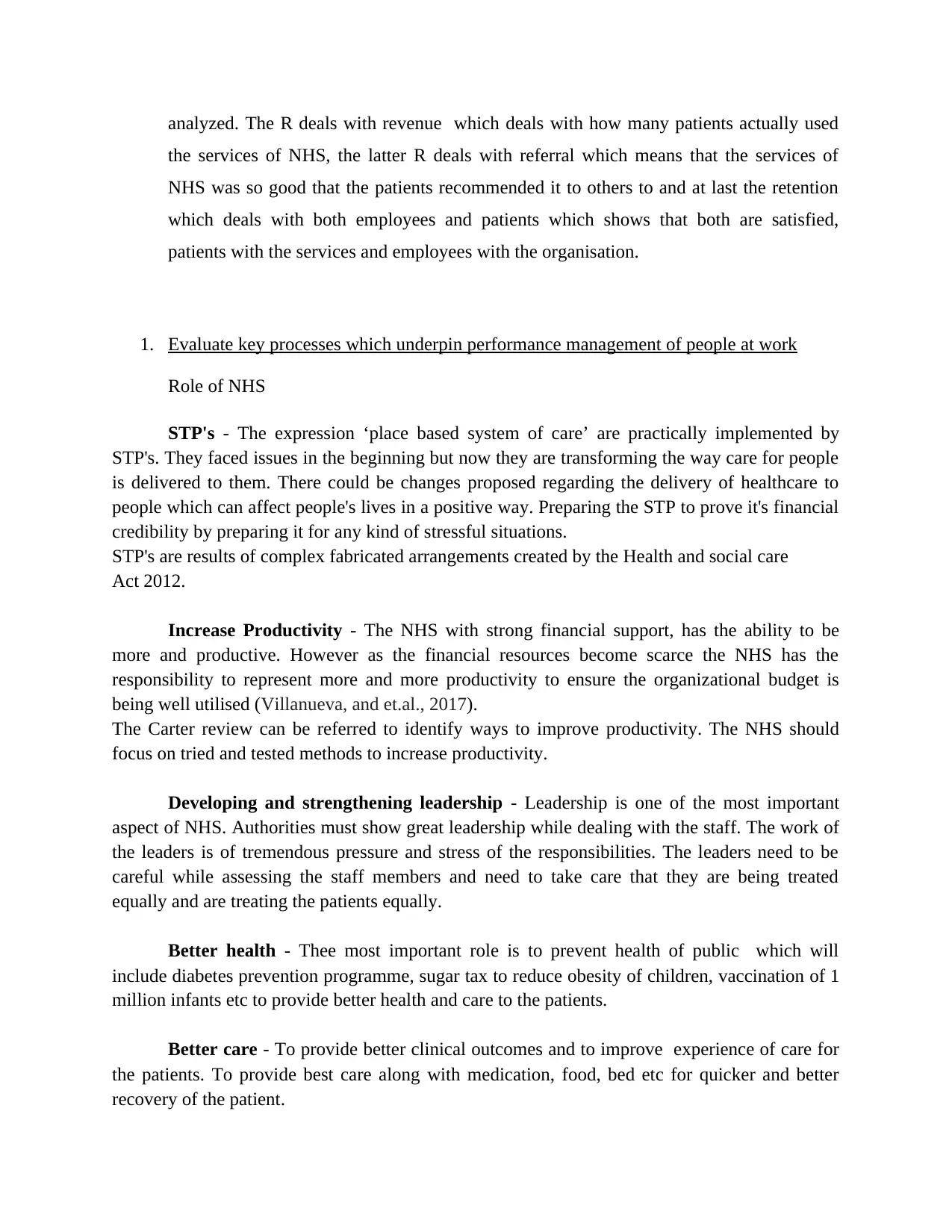
analyzed. The R deals with revenue which deals with how many patients actually used
the services of NHS, the latter R deals with referral which means that the services of
NHS was so good that the patients recommended it to others to and at last the retention
which deals with both employees and patients which shows that both are satisfied,
patients with the services and employees with the organisation.
1. Evaluate key processes which underpin performance management of people at work
Role of NHS
STP's - The expression ‘place based system of care’ are practically implemented by
STP's. They faced issues in the beginning but now they are transforming the way care for people
is delivered to them. There could be changes proposed regarding the delivery of healthcare to
people which can affect people's lives in a positive way. Preparing the STP to prove it's financial
credibility by preparing it for any kind of stressful situations.
STP's are results of complex fabricated arrangements created by the Health and social care
Act 2012.
Increase Productivity - The NHS with strong financial support, has the ability to be
more and productive. However as the financial resources become scarce the NHS has the
responsibility to represent more and more productivity to ensure the organizational budget is
being well utilised (Villanueva, and et.al., 2017).
The Carter review can be referred to identify ways to improve productivity. The NHS should
focus on tried and tested methods to increase productivity.
Developing and strengthening leadership - Leadership is one of the most important
aspect of NHS. Authorities must show great leadership while dealing with the staff. The work of
the leaders is of tremendous pressure and stress of the responsibilities. The leaders need to be
careful while assessing the staff members and need to take care that they are being treated
equally and are treating the patients equally.
Better health - Thee most important role is to prevent health of public which will
include diabetes prevention programme, sugar tax to reduce obesity of children, vaccination of 1
million infants etc to provide better health and care to the patients.
Better care - To provide better clinical outcomes and to improve experience of care for
the patients. To provide best care along with medication, food, bed etc for quicker and better
recovery of the patient.
the services of NHS, the latter R deals with referral which means that the services of
NHS was so good that the patients recommended it to others to and at last the retention
which deals with both employees and patients which shows that both are satisfied,
patients with the services and employees with the organisation.
1. Evaluate key processes which underpin performance management of people at work
Role of NHS
STP's - The expression ‘place based system of care’ are practically implemented by
STP's. They faced issues in the beginning but now they are transforming the way care for people
is delivered to them. There could be changes proposed regarding the delivery of healthcare to
people which can affect people's lives in a positive way. Preparing the STP to prove it's financial
credibility by preparing it for any kind of stressful situations.
STP's are results of complex fabricated arrangements created by the Health and social care
Act 2012.
Increase Productivity - The NHS with strong financial support, has the ability to be
more and productive. However as the financial resources become scarce the NHS has the
responsibility to represent more and more productivity to ensure the organizational budget is
being well utilised (Villanueva, and et.al., 2017).
The Carter review can be referred to identify ways to improve productivity. The NHS should
focus on tried and tested methods to increase productivity.
Developing and strengthening leadership - Leadership is one of the most important
aspect of NHS. Authorities must show great leadership while dealing with the staff. The work of
the leaders is of tremendous pressure and stress of the responsibilities. The leaders need to be
careful while assessing the staff members and need to take care that they are being treated
equally and are treating the patients equally.
Better health - Thee most important role is to prevent health of public which will
include diabetes prevention programme, sugar tax to reduce obesity of children, vaccination of 1
million infants etc to provide better health and care to the patients.
Better care - To provide better clinical outcomes and to improve experience of care for
the patients. To provide best care along with medication, food, bed etc for quicker and better
recovery of the patient.
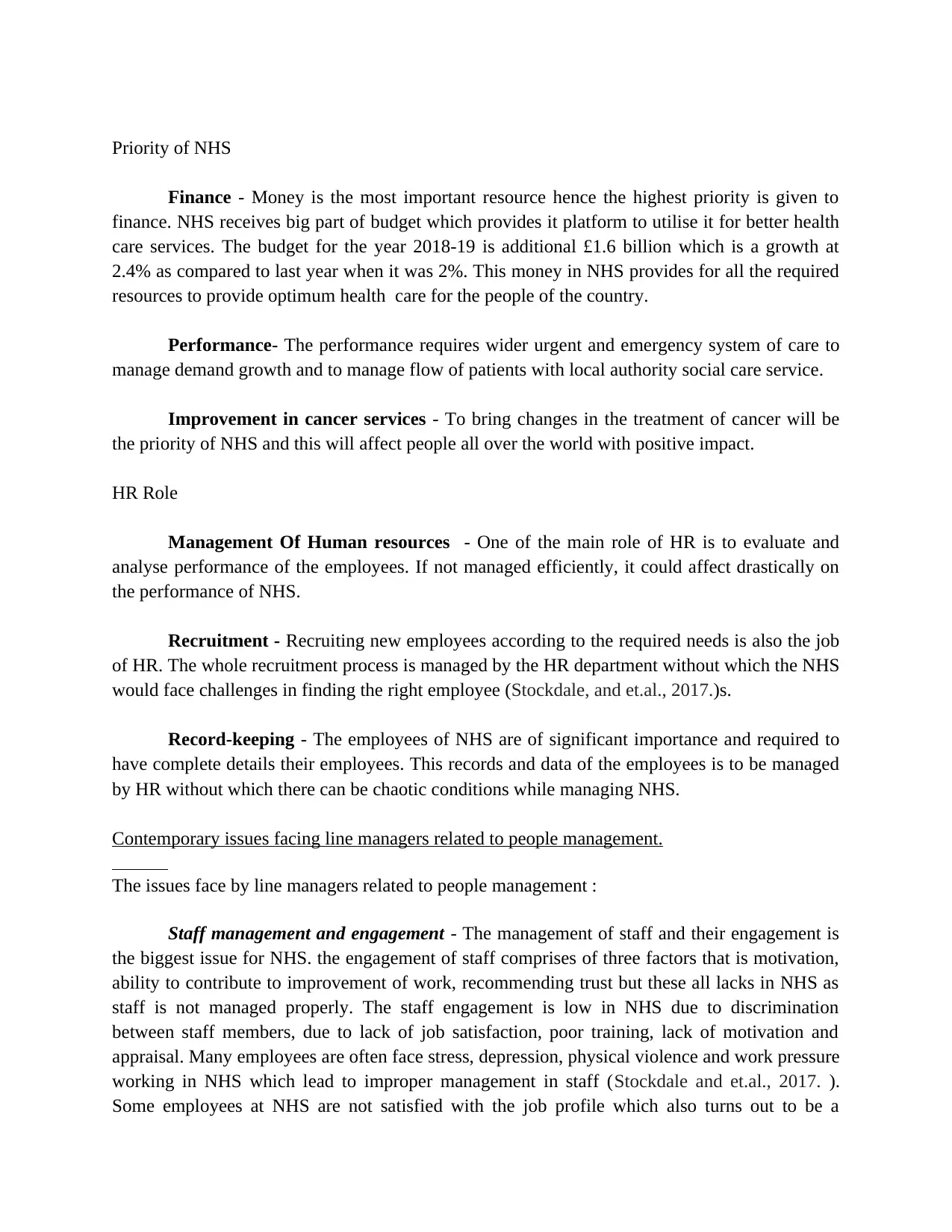
Priority of NHS
Finance - Money is the most important resource hence the highest priority is given to
finance. NHS receives big part of budget which provides it platform to utilise it for better health
care services. The budget for the year 2018-19 is additional £1.6 billion which is a growth at
2.4% as compared to last year when it was 2%. This money in NHS provides for all the required
resources to provide optimum health care for the people of the country.
Performance- The performance requires wider urgent and emergency system of care to
manage demand growth and to manage flow of patients with local authority social care service.
Improvement in cancer services - To bring changes in the treatment of cancer will be
the priority of NHS and this will affect people all over the world with positive impact.
HR Role
Management Of Human resources - One of the main role of HR is to evaluate and
analyse performance of the employees. If not managed efficiently, it could affect drastically on
the performance of NHS.
Recruitment - Recruiting new employees according to the required needs is also the job
of HR. The whole recruitment process is managed by the HR department without which the NHS
would face challenges in finding the right employee (Stockdale, and et.al., 2017.)s.
Record-keeping - The employees of NHS are of significant importance and required to
have complete details their employees. This records and data of the employees is to be managed
by HR without which there can be chaotic conditions while managing NHS.
Contemporary issues facing line managers related to people management.
The issues face by line managers related to people management :
Staff management and engagement - The management of staff and their engagement is
the biggest issue for NHS. the engagement of staff comprises of three factors that is motivation,
ability to contribute to improvement of work, recommending trust but these all lacks in NHS as
staff is not managed properly. The staff engagement is low in NHS due to discrimination
between staff members, due to lack of job satisfaction, poor training, lack of motivation and
appraisal. Many employees are often face stress, depression, physical violence and work pressure
working in NHS which lead to improper management in staff (Stockdale and et.al., 2017. ).
Some employees at NHS are not satisfied with the job profile which also turns out to be a
Finance - Money is the most important resource hence the highest priority is given to
finance. NHS receives big part of budget which provides it platform to utilise it for better health
care services. The budget for the year 2018-19 is additional £1.6 billion which is a growth at
2.4% as compared to last year when it was 2%. This money in NHS provides for all the required
resources to provide optimum health care for the people of the country.
Performance- The performance requires wider urgent and emergency system of care to
manage demand growth and to manage flow of patients with local authority social care service.
Improvement in cancer services - To bring changes in the treatment of cancer will be
the priority of NHS and this will affect people all over the world with positive impact.
HR Role
Management Of Human resources - One of the main role of HR is to evaluate and
analyse performance of the employees. If not managed efficiently, it could affect drastically on
the performance of NHS.
Recruitment - Recruiting new employees according to the required needs is also the job
of HR. The whole recruitment process is managed by the HR department without which the NHS
would face challenges in finding the right employee (Stockdale, and et.al., 2017.)s.
Record-keeping - The employees of NHS are of significant importance and required to
have complete details their employees. This records and data of the employees is to be managed
by HR without which there can be chaotic conditions while managing NHS.
Contemporary issues facing line managers related to people management.
The issues face by line managers related to people management :
Staff management and engagement - The management of staff and their engagement is
the biggest issue for NHS. the engagement of staff comprises of three factors that is motivation,
ability to contribute to improvement of work, recommending trust but these all lacks in NHS as
staff is not managed properly. The staff engagement is low in NHS due to discrimination
between staff members, due to lack of job satisfaction, poor training, lack of motivation and
appraisal. Many employees are often face stress, depression, physical violence and work pressure
working in NHS which lead to improper management in staff (Stockdale and et.al., 2017. ).
Some employees at NHS are not satisfied with the job profile which also turns out to be a
⊘ This is a preview!⊘
Do you want full access?
Subscribe today to unlock all pages.

Trusted by 1+ million students worldwide
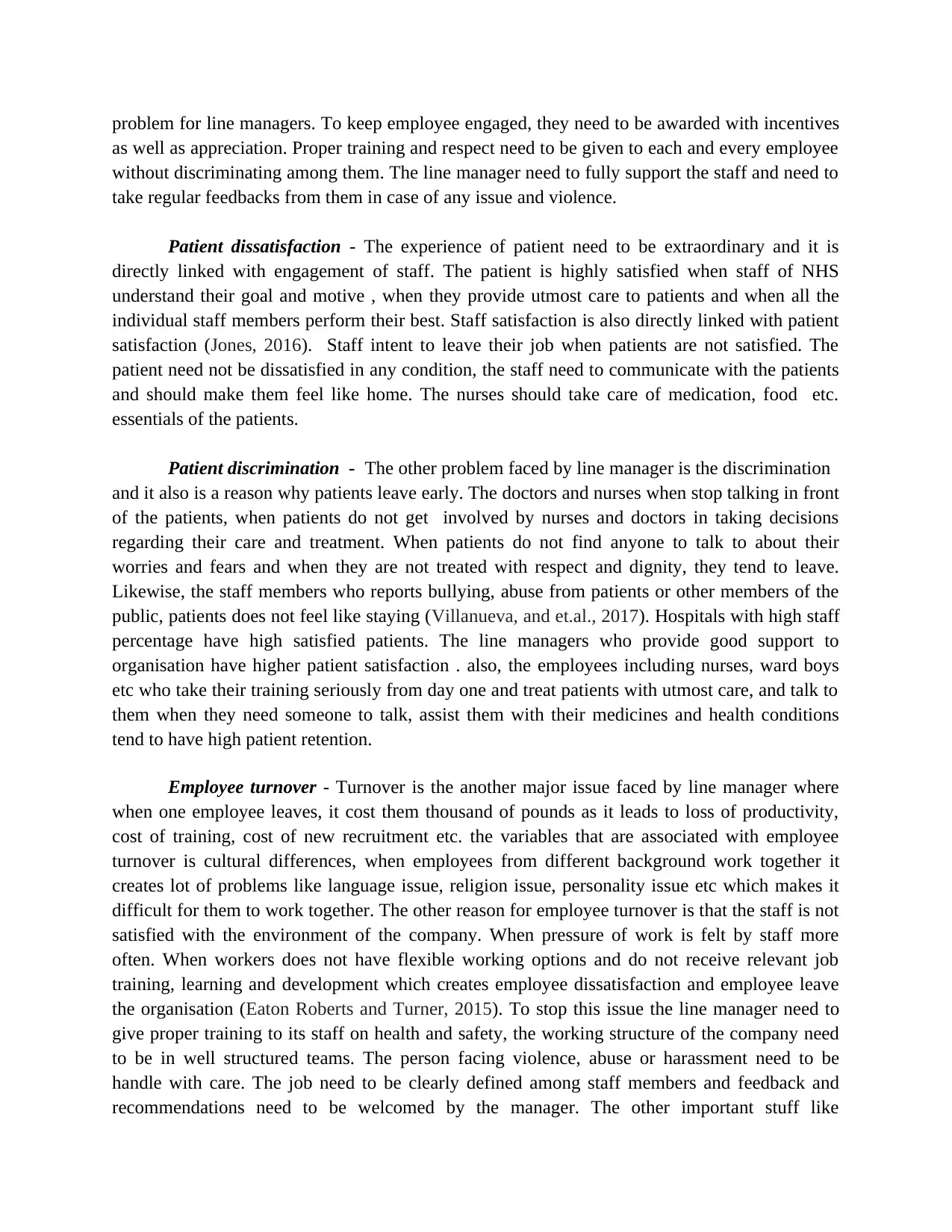
problem for line managers. To keep employee engaged, they need to be awarded with incentives
as well as appreciation. Proper training and respect need to be given to each and every employee
without discriminating among them. The line manager need to fully support the staff and need to
take regular feedbacks from them in case of any issue and violence.
Patient dissatisfaction - The experience of patient need to be extraordinary and it is
directly linked with engagement of staff. The patient is highly satisfied when staff of NHS
understand their goal and motive , when they provide utmost care to patients and when all the
individual staff members perform their best. Staff satisfaction is also directly linked with patient
satisfaction (Jones, 2016). Staff intent to leave their job when patients are not satisfied. The
patient need not be dissatisfied in any condition, the staff need to communicate with the patients
and should make them feel like home. The nurses should take care of medication, food etc.
essentials of the patients.
Patient discrimination - The other problem faced by line manager is the discrimination
and it also is a reason why patients leave early. The doctors and nurses when stop talking in front
of the patients, when patients do not get involved by nurses and doctors in taking decisions
regarding their care and treatment. When patients do not find anyone to talk to about their
worries and fears and when they are not treated with respect and dignity, they tend to leave.
Likewise, the staff members who reports bullying, abuse from patients or other members of the
public, patients does not feel like staying (Villanueva, and et.al., 2017). Hospitals with high staff
percentage have high satisfied patients. The line managers who provide good support to
organisation have higher patient satisfaction . also, the employees including nurses, ward boys
etc who take their training seriously from day one and treat patients with utmost care, and talk to
them when they need someone to talk, assist them with their medicines and health conditions
tend to have high patient retention.
Employee turnover - Turnover is the another major issue faced by line manager where
when one employee leaves, it cost them thousand of pounds as it leads to loss of productivity,
cost of training, cost of new recruitment etc. the variables that are associated with employee
turnover is cultural differences, when employees from different background work together it
creates lot of problems like language issue, religion issue, personality issue etc which makes it
difficult for them to work together. The other reason for employee turnover is that the staff is not
satisfied with the environment of the company. When pressure of work is felt by staff more
often. When workers does not have flexible working options and do not receive relevant job
training, learning and development which creates employee dissatisfaction and employee leave
the organisation (Eaton Roberts and Turner, 2015). To stop this issue the line manager need to
give proper training to its staff on health and safety, the working structure of the company need
to be in well structured teams. The person facing violence, abuse or harassment need to be
handle with care. The job need to be clearly defined among staff members and feedback and
recommendations need to be welcomed by the manager. The other important stuff like
as well as appreciation. Proper training and respect need to be given to each and every employee
without discriminating among them. The line manager need to fully support the staff and need to
take regular feedbacks from them in case of any issue and violence.
Patient dissatisfaction - The experience of patient need to be extraordinary and it is
directly linked with engagement of staff. The patient is highly satisfied when staff of NHS
understand their goal and motive , when they provide utmost care to patients and when all the
individual staff members perform their best. Staff satisfaction is also directly linked with patient
satisfaction (Jones, 2016). Staff intent to leave their job when patients are not satisfied. The
patient need not be dissatisfied in any condition, the staff need to communicate with the patients
and should make them feel like home. The nurses should take care of medication, food etc.
essentials of the patients.
Patient discrimination - The other problem faced by line manager is the discrimination
and it also is a reason why patients leave early. The doctors and nurses when stop talking in front
of the patients, when patients do not get involved by nurses and doctors in taking decisions
regarding their care and treatment. When patients do not find anyone to talk to about their
worries and fears and when they are not treated with respect and dignity, they tend to leave.
Likewise, the staff members who reports bullying, abuse from patients or other members of the
public, patients does not feel like staying (Villanueva, and et.al., 2017). Hospitals with high staff
percentage have high satisfied patients. The line managers who provide good support to
organisation have higher patient satisfaction . also, the employees including nurses, ward boys
etc who take their training seriously from day one and treat patients with utmost care, and talk to
them when they need someone to talk, assist them with their medicines and health conditions
tend to have high patient retention.
Employee turnover - Turnover is the another major issue faced by line manager where
when one employee leaves, it cost them thousand of pounds as it leads to loss of productivity,
cost of training, cost of new recruitment etc. the variables that are associated with employee
turnover is cultural differences, when employees from different background work together it
creates lot of problems like language issue, religion issue, personality issue etc which makes it
difficult for them to work together. The other reason for employee turnover is that the staff is not
satisfied with the environment of the company. When pressure of work is felt by staff more
often. When workers does not have flexible working options and do not receive relevant job
training, learning and development which creates employee dissatisfaction and employee leave
the organisation (Eaton Roberts and Turner, 2015). To stop this issue the line manager need to
give proper training to its staff on health and safety, the working structure of the company need
to be in well structured teams. The person facing violence, abuse or harassment need to be
handle with care. The job need to be clearly defined among staff members and feedback and
recommendations need to be welcomed by the manager. The other important stuff like
Paraphrase This Document
Need a fresh take? Get an instant paraphrase of this document with our AI Paraphraser
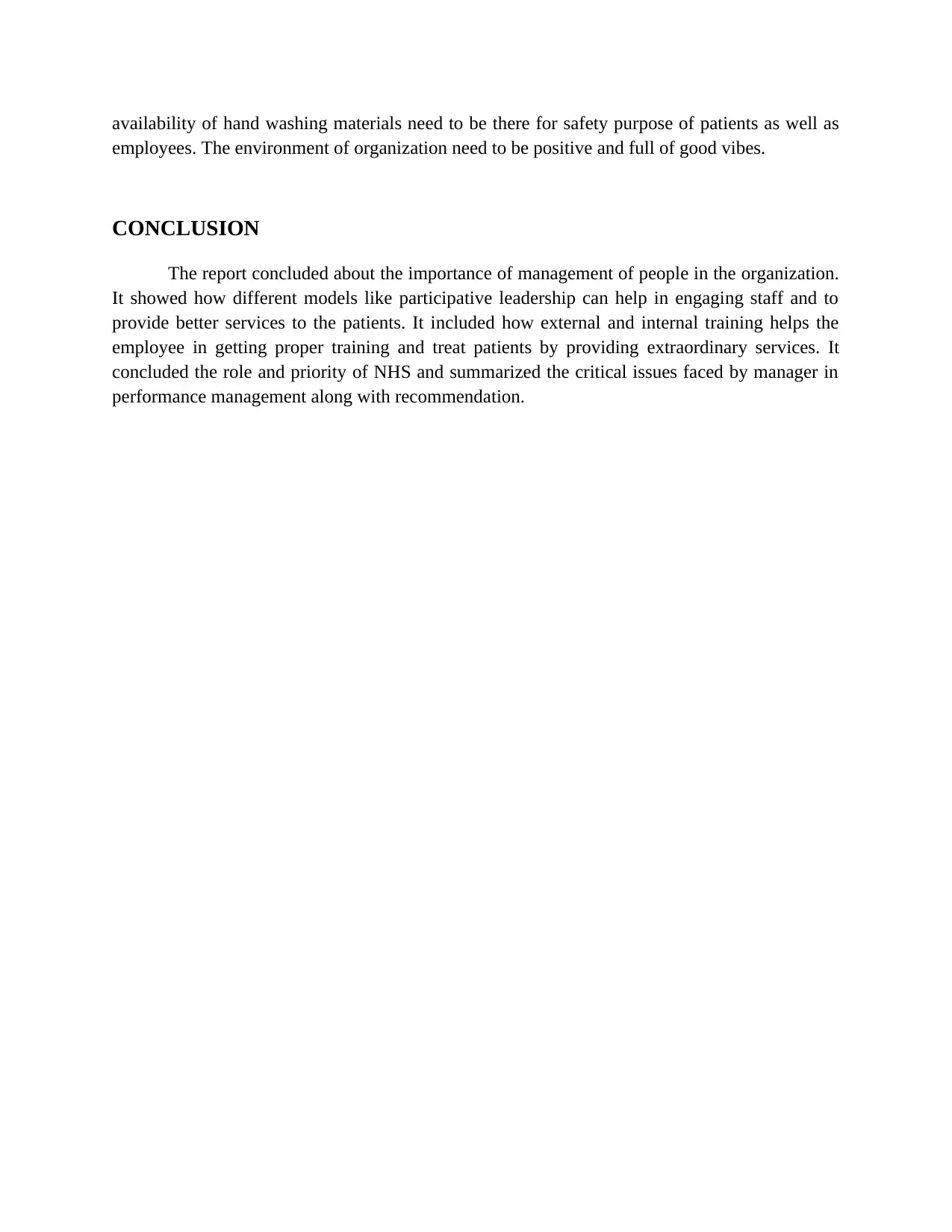
availability of hand washing materials need to be there for safety purpose of patients as well as
employees. The environment of organization need to be positive and full of good vibes.
CONCLUSION
The report concluded about the importance of management of people in the organization.
It showed how different models like participative leadership can help in engaging staff and to
provide better services to the patients. It included how external and internal training helps the
employee in getting proper training and treat patients by providing extraordinary services. It
concluded the role and priority of NHS and summarized the critical issues faced by manager in
performance management along with recommendation.
employees. The environment of organization need to be positive and full of good vibes.
CONCLUSION
The report concluded about the importance of management of people in the organization.
It showed how different models like participative leadership can help in engaging staff and to
provide better services to the patients. It included how external and internal training helps the
employee in getting proper training and treat patients by providing extraordinary services. It
concluded the role and priority of NHS and summarized the critical issues faced by manager in
performance management along with recommendation.
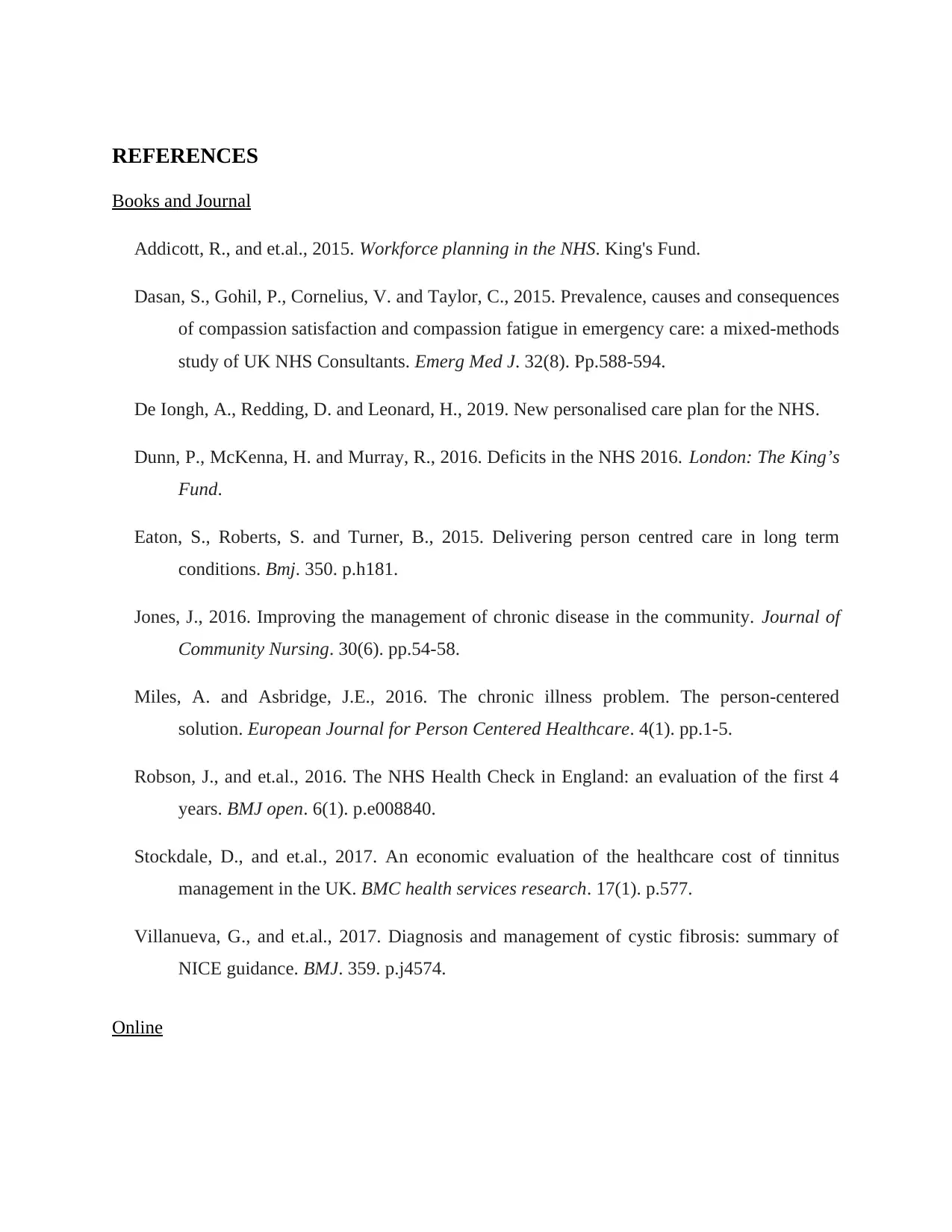
REFERENCES
Books and Journal
Addicott, R., and et.al., 2015. Workforce planning in the NHS. King's Fund.
Dasan, S., Gohil, P., Cornelius, V. and Taylor, C., 2015. Prevalence, causes and consequences
of compassion satisfaction and compassion fatigue in emergency care: a mixed-methods
study of UK NHS Consultants. Emerg Med J. 32(8). Pp.588-594.
De Iongh, A., Redding, D. and Leonard, H., 2019. New personalised care plan for the NHS.
Dunn, P., McKenna, H. and Murray, R., 2016. Deficits in the NHS 2016. London: The King’s
Fund.
Eaton, S., Roberts, S. and Turner, B., 2015. Delivering person centred care in long term
conditions. Bmj. 350. p.h181.
Jones, J., 2016. Improving the management of chronic disease in the community. Journal of
Community Nursing. 30(6). pp.54-58.
Miles, A. and Asbridge, J.E., 2016. The chronic illness problem. The person-centered
solution. European Journal for Person Centered Healthcare. 4(1). pp.1-5.
Robson, J., and et.al., 2016. The NHS Health Check in England: an evaluation of the first 4
years. BMJ open. 6(1). p.e008840.
Stockdale, D., and et.al., 2017. An economic evaluation of the healthcare cost of tinnitus
management in the UK. BMC health services research. 17(1). p.577.
Villanueva, G., and et.al., 2017. Diagnosis and management of cystic fibrosis: summary of
NICE guidance. BMJ. 359. p.j4574.
Online
Books and Journal
Addicott, R., and et.al., 2015. Workforce planning in the NHS. King's Fund.
Dasan, S., Gohil, P., Cornelius, V. and Taylor, C., 2015. Prevalence, causes and consequences
of compassion satisfaction and compassion fatigue in emergency care: a mixed-methods
study of UK NHS Consultants. Emerg Med J. 32(8). Pp.588-594.
De Iongh, A., Redding, D. and Leonard, H., 2019. New personalised care plan for the NHS.
Dunn, P., McKenna, H. and Murray, R., 2016. Deficits in the NHS 2016. London: The King’s
Fund.
Eaton, S., Roberts, S. and Turner, B., 2015. Delivering person centred care in long term
conditions. Bmj. 350. p.h181.
Jones, J., 2016. Improving the management of chronic disease in the community. Journal of
Community Nursing. 30(6). pp.54-58.
Miles, A. and Asbridge, J.E., 2016. The chronic illness problem. The person-centered
solution. European Journal for Person Centered Healthcare. 4(1). pp.1-5.
Robson, J., and et.al., 2016. The NHS Health Check in England: an evaluation of the first 4
years. BMJ open. 6(1). p.e008840.
Stockdale, D., and et.al., 2017. An economic evaluation of the healthcare cost of tinnitus
management in the UK. BMC health services research. 17(1). p.577.
Villanueva, G., and et.al., 2017. Diagnosis and management of cystic fibrosis: summary of
NICE guidance. BMJ. 359. p.j4574.
Online
⊘ This is a preview!⊘
Do you want full access?
Subscribe today to unlock all pages.

Trusted by 1+ million students worldwide
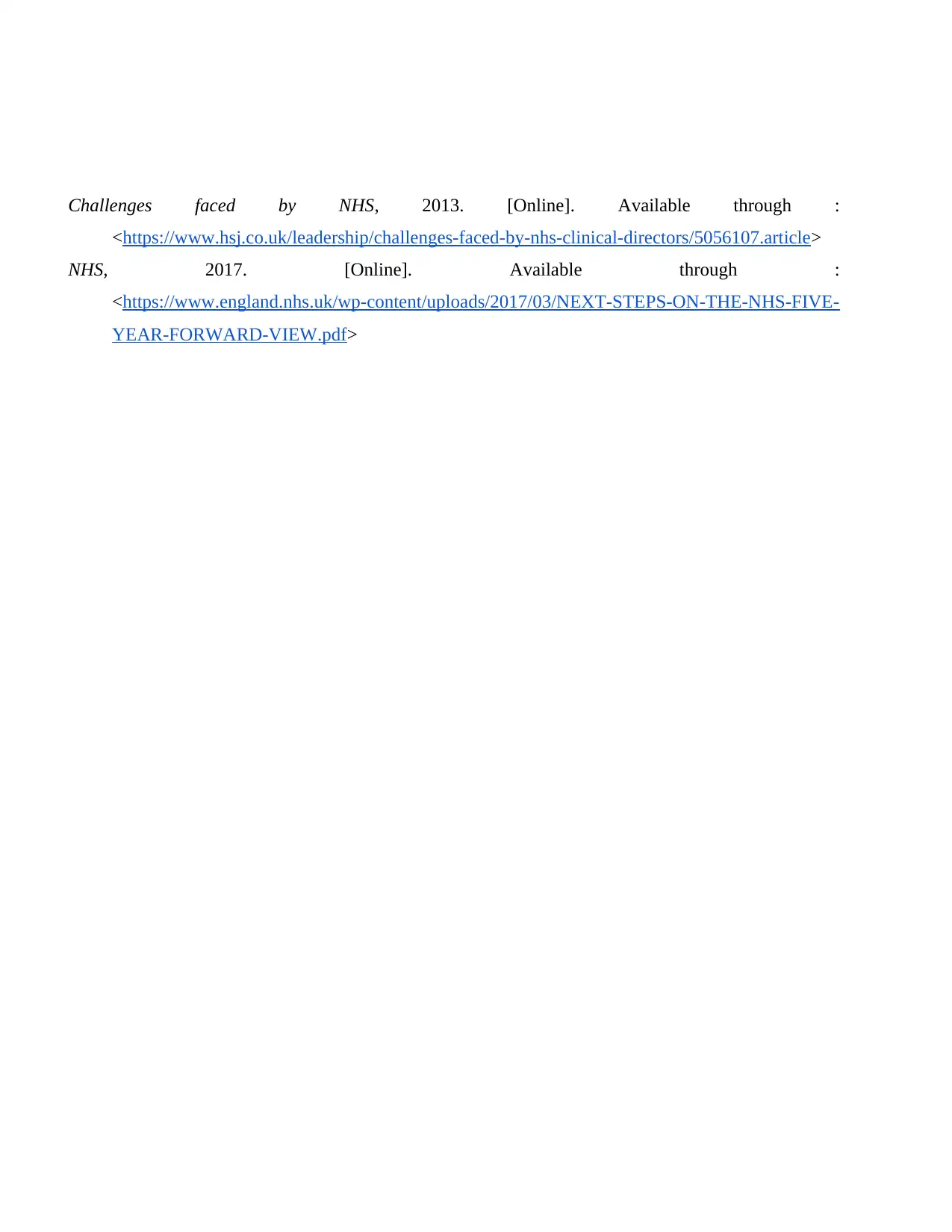
Challenges faced by NHS, 2013. [Online]. Available through :
<https://www.hsj.co.uk/leadership/challenges-faced-by-nhs-clinical-directors/5056107.article>
NHS, 2017. [Online]. Available through :
<https://www.england.nhs.uk/wp-content/uploads/2017/03/NEXT-STEPS-ON-THE-NHS-FIVE-
YEAR-FORWARD-VIEW.pdf>
<https://www.hsj.co.uk/leadership/challenges-faced-by-nhs-clinical-directors/5056107.article>
NHS, 2017. [Online]. Available through :
<https://www.england.nhs.uk/wp-content/uploads/2017/03/NEXT-STEPS-ON-THE-NHS-FIVE-
YEAR-FORWARD-VIEW.pdf>
1 out of 10
Related Documents
Your All-in-One AI-Powered Toolkit for Academic Success.
+13062052269
info@desklib.com
Available 24*7 on WhatsApp / Email
![[object Object]](/_next/static/media/star-bottom.7253800d.svg)
Unlock your academic potential
Copyright © 2020–2026 A2Z Services. All Rights Reserved. Developed and managed by ZUCOL.





